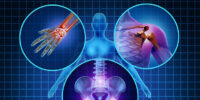Why Nutritional Support Is Important for Pain Relief

This article examines the significance of nutritional support in the context of pain relief.
The objective of this study is to explore the role of diet in pain management and identify essential nutrients that contribute to pain relief.
Furthermore, it investigates the impact of nutrition on inflammation and pain, as well as the connection between gut health and pain.
Additionally, this article explores the integration of supplements into pain management strategies and provides tips for creating a nutrient-rich pain relief plan.
Key Takeaways
- Certain dietary factors, such as inflammation-promoting foods, can contribute to chronic pain.
- A well-balanced and anti-inflammatory diet can help reduce pain levels.
- Nutrients like Vitamin D, Omega-3 fatty acids, Magnesium, and Vitamin B12 play a role in pain management.
- Incorporating healing foods and natural remedies, such as ginger, turmeric, and cherries, into the diet can alleviate pain and reduce inflammation.
The Role of Diet in Pain Management
The role of diet in pain management involves examining the potential impact of various dietary factors on pain perception and exploring the effectiveness of specific dietary interventions in reducing pain levels.
Chronic pain is a complex condition that can have a significant impact on an individual’s quality of life. Recent studies have investigated the relationship between diet and chronic pain, particularly focusing on the impact of diet on neurological pain.
It has been suggested that certain dietary factors, such as inflammation-promoting foods, can contribute to the development and exacerbation of chronic pain. On the other hand, a balanced and anti-inflammatory diet, rich in nutrients and antioxidants, has shown potential in reducing pain levels.
Further research is needed to fully understand the mechanisms underlying the relationship between diet and chronic pain and to develop personalized dietary interventions for pain management.
Essential Nutrients for Pain Relief
Vitamins and minerals play a crucial role in alleviating discomfort. Essential nutrients are essential for pain management. They support the body’s natural healing processes and help reduce inflammation.
The following essential nutrients are particularly beneficial for pain relief:
- Vitamin D: This vitamin is important for bone health and can help reduce musculoskeletal pain.
- Omega-3 fatty acids: Found in fish oil and flaxseed oil, these fatty acids have anti-inflammatory properties that can help reduce pain.
- Magnesium: This mineral is involved in nerve function and muscle relaxation, making it helpful for reducing pain and muscle cramps.
- Vitamin B12: This vitamin is important for nerve health and can help alleviate neuropathic pain.
Ensuring an adequate intake of these essential nutrients through a balanced diet or supplementation can support pain management efforts and promote overall well-being.
How Nutrition Impacts Inflammation and Pain
This discussion aims to explore the relationship between diet, inflammation, and pain relief.
The impact of nutrition on inflammation and pain management has been widely studied, highlighting the potential benefits of a well-balanced diet in reducing pain and inflammation.
Diet and Inflammation
Research suggests a potential link between dietary choices and the inflammatory response in the body. Certain foods have been identified as having anti-inflammatory properties, which may play a role in chronic pain management.
Anti-inflammatory foods are those that contain high levels of antioxidants and anti-inflammatory compounds, such as fruits, vegetables, whole grains, and fatty fish. These foods have been shown to reduce the production of inflammatory markers in the body and can help alleviate pain associated with chronic conditions such as arthritis and fibromyalgia.
Additionally, a diet rich in anti-inflammatory foods can support overall health and well-being, reducing the risk of other chronic diseases. Incorporating these dietary choices into daily meals may provide a natural and effective approach to managing chronic pain and improving overall quality of life.
Nutrients for Pain Relief
Consuming a well-balanced and nutrient-rich diet has been shown to have positive effects on managing chronic conditions and improving overall health and well-being. When it comes to pain relief, certain nutrients can play a crucial role in reducing inflammation, promoting tissue repair, and supporting the body’s natural healing processes.
Here are three key nutrients that have been associated with pain relief:
- Omega-3 fatty acids: Found in fatty fish, flaxseeds, and walnuts, omega-3 fatty acids have anti-inflammatory properties that can help alleviate pain associated with conditions like arthritis and fibromyalgia.
- Vitamin D: Adequate vitamin D levels have been linked to reduced pain sensitivity. Sunlight exposure, fortified dairy products, and fatty fish are good sources of vitamin D.
- Magnesium: This mineral helps relax muscles and may reduce muscle pain and cramps. Green leafy vegetables, nuts, seeds, and whole grains are rich in magnesium.
In addition to proper nutrition, regular exercise and alternative therapies like acupuncture and yoga can also contribute to pain management and overall well-being.
Foods That Promote Healing and Reduce Pain
Certain foods have been found to possess healing properties and can effectively alleviate pain. Incorporating healing foods and natural remedies into one’s diet can provide relief from various types of pain. These foods contain specific nutrients and compounds that have anti-inflammatory and analgesic properties, helping to reduce inflammation and alleviate pain. Additionally, they can support the body’s natural healing processes, promoting faster recovery and reducing discomfort. Some examples of healing foods that have been shown to reduce pain include:
| Food | Healing Properties |
|---|---|
| Ginger | Anti-inflammatory and analgesic properties |
| Turmeric | Powerful anti-inflammatory and pain-relieving effects |
| Cherries | Natural source of antioxidants and anti-inflammatory |
These foods can be easily incorporated into one’s diet and offer a natural and holistic approach to pain relief.
The Connection Between Gut Health and Pain
The previous subtopic discussed the impact of certain foods on healing and pain reduction. This leads to an exploration of the connection between gut health and pain relief. Emerging research has highlighted the influence of the gut-brain connection and the role of the microbiome in modulating pain perception and response.
Key points to consider regarding the gut-brain connection, microbiome, and pain relief include:
- Gut-brain axis: The bidirectional communication between the gut and the brain plays a crucial role in regulating various physiological functions, including pain perception.
- Microbiome diversity: A healthy and diverse gut microbiome is associated with reduced inflammation and improved pain thresholds.
- Gut barrier integrity: A compromised gut barrier can lead to increased permeability, allowing harmful substances to enter the bloodstream and trigger inflammation and pain.
- Probiotics and prebiotics: Certain strains of probiotics and prebiotics have shown potential in reducing pain and inflammation by promoting a healthy gut microbiome.
Understanding and harnessing the gut-brain connection and microbiome may offer innovative approaches for pain management and relief.
Integrating Supplements for Pain Management
This discussion aims to explore the optimal combinations of supplements for pain management, the efficacy of natural remedies in alleviating pain, and the benefits of adopting a holistic approach towards pain relief.
Understanding the most effective supplement combinations can help individuals make informed choices about their pain management regimen.
Additionally, exploring the efficacy of natural remedies can provide insights into alternative options for pain relief.
Lastly, considering the benefits of a holistic approach can shed light on the importance of addressing the physical, emotional, and mental aspects of pain management for overall well-being.
Optimal Supplement Combinations
Optimal supplement combinations for pain relief play a crucial role in providing the necessary nutritional support. When it comes to pain management, finding the right combination of supplements can significantly enhance the effectiveness of treatment. Here are three important aspects to consider:
- Optimal supplement dosage: Determining the appropriate dosage of each supplement is essential for achieving the desired pain relief. It is important to follow recommended guidelines and consult with healthcare professionals to avoid any potential adverse effects or interactions.
- Common nutrient deficiencies: Identifying common nutrient deficiencies associated with pain conditions can help in formulating the right combination of supplements. For example, deficiencies in magnesium, vitamin D, and omega-3 fatty acids have been linked to increased pain sensitivity.
- Synergistic effects: Combining supplements with complementary mechanisms of action can produce synergistic effects, enhancing the overall pain relief. For instance, combining curcumin with ginger or black pepper extract can increase its bioavailability and anti-inflammatory properties.
Efficacy of Natural Remedies
Evaluating the efficacy of natural remedies is crucial in determining their potential usefulness in managing various health conditions. Natural remedies, often rooted in traditional medicine, are commonly used as a holistic approach to health and wellness.
However, the scientific evidence for their effectiveness is limited, and rigorous clinical trials are lacking in many cases. While some natural remedies have shown promise in certain health conditions, such as herbal supplements for mild depression or acupuncture for pain relief, more research is needed to establish their true efficacy.
It is important to approach natural remedies with caution and consult with healthcare professionals, as they can interact with prescription medications and may not be suitable for everyone. Furthermore, the safety and quality of natural remedies vary, highlighting the need for standardized regulations and quality control measures in this field.
Benefits of Holistic Approach
The holistic approach to healthcare encompasses various aspects of an individual’s well-being, including physical, emotional, and spiritual dimensions. It recognizes the intricate connection between the mind and body, emphasizing the importance of addressing both aspects for optimal health. This approach acknowledges that physical ailments can have underlying emotional and spiritual causes, and vice versa. By considering the mind-body connection, holistic healthcare professionals aim to promote balance and harmony within the individual.
Alternative therapies are often used in conjunction with conventional medical treatments to address the holistic well-being of individuals. These therapies include practices such as acupuncture, meditation, yoga, and herbal medicine. They focus on promoting wellness and preventing illness by supporting the body’s natural healing abilities. Alternative therapies are believed to work by restoring the balance of energy within the body, reducing stress, and promoting overall well-being.
Tips for Creating a Nutrient-Rich Pain Relief Plan
Implementing a nutrient-rich pain relief plan involves considering various factors such as dietary modifications and supplement recommendations. When creating a customized pain relief plan, it is important to incorporate nutritional strategies for pain management. Here are some tips to help create a nutrient-rich pain relief plan:
- Identify nutrient deficiencies: Conduct a thorough assessment to identify any nutrient deficiencies that may be contributing to the pain. This can be done through blood tests and consultations with a healthcare professional.
- Optimize macronutrient intake: Ensure a balanced intake of carbohydrates, proteins, and fats to support the body’s energy needs and promote tissue repair.
- Include anti-inflammatory foods: Incorporate foods that have anti-inflammatory properties, such as fatty fish, turmeric, ginger, and leafy greens, to help reduce pain and inflammation.
- Consider supplements: Discuss with a healthcare professional about the potential benefits of supplements like omega-3 fatty acids, vitamin D, and magnesium in managing pain.
Frequently Asked Questions
What Are Some Common Lifestyle Factors That Can Worsen Pain and How Can Nutrition Help Alleviate Them?
Common lifestyle factors that can worsen pain include stress and lack of exercise. Nutrition can help alleviate these factors by providing essential nutrients that support stress management and promote healing and recovery through exercise-induced inflammation reduction.
Can Certain Foods Actually Increase Pain Levels?
Food sensitivities can contribute to increased pain levels. Additionally, the consumption of inflammatory foods has been shown to affect pain perception. These factors highlight the potential impact of certain foods on pain levels.
Are There Any Specific Nutrients or Foods That Can Help Manage Chronic Pain?
Specific nutrients and foods have been studied for their potential role in managing chronic pain. Research suggests that certain nutrients, such as omega-3 fatty acids and antioxidants, may have anti-inflammatory properties that could help alleviate pain symptoms.
How Does Gut Health Impact Pain Management and What Dietary Changes Can Improve Gut Health?
The gut-brain connection plays a crucial role in pain management. Improving gut health through dietary changes, such as incorporating probiotics, can positively impact pain relief.
Is It Necessary to Take Supplements in Order to Achieve Optimal Pain Relief Through Nutrition, or Can a Well-Balanced Diet Alone Suffice?
To determine the necessity of supplements for optimal pain relief through nutrition, it is important to consider the adequacy of a well-balanced diet alone. This evaluation will provide insight into the role and importance of supplementation in achieving pain relief.








